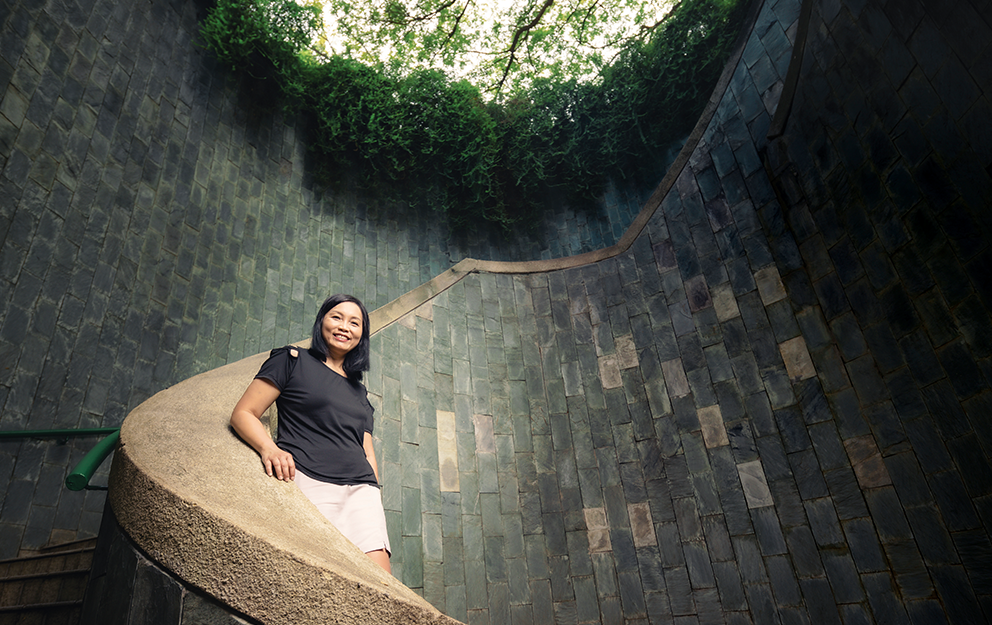
Mrs Fann-Chew Hwee Cheng (Diploma in Education (DipEd), Class of 1994), an educator now based in the US, wants to keep Chinese language alive for the next generation. But will she find success among the young learners in her new, English-speaking environment?
Before leaving her post at a school in 2017 to accompany her husband to the US, Hwee Cheng had always been a teacher. Chinese and Civics and Moral Education were her forte, although she also enjoyed teaching Physical Education, Art and Music, which allowed her the freedom to bond with students without academic pressure.
“I’ve always wanted to teach,” confessed Hwee Cheng. “As a little girl, I’d literally sit my dolls down and teach them. When I got older, I did a bit of storytelling at a community library, before enrolling to become a nursery teacher. These experiences affirmed my decision to study at the NIE, instead of going to the polytechnic.”
Her biggest motivation as a teacher was the chance to inspire children to be morally upright and to contribute to society. “That’s why I never teach Chinese merely as a Mother Tongue. Rather, I would package my lessons with knowledge and values, so that kids could see and love the beauty of the language and culture instead of focusing squarely on grades,” she shared.
Initially, Hwee Cheng thought she could use a break from teaching while in the US. However, after about a year into her no-pay leave, she started to really miss the eager faces of her young students, and how they would smile when they learn something interesting or catch her jokes. Feeling the need to go back to the classroom, she volunteered at a local Chinese school, filling in for a teacher who had left.
When the pandemic struck, a new opportunity presented itself. Many of Hwee Cheng’s Singaporean friends had been worried about their kids having not much to do at home. Inspired by the everyday heroes and frontline workers doing their part in the community, Hwee Cheng wanted to help.
“As I love telling stories, I decided to start a livestream project called ‘Story Time’, where I would read meaningful books and incorporate themes like moral values, science, culture and festivals to engage with young children. Since I wasn’t shy to act, I’d often use exaggerated movements to convey important learning points. I found that this aided my young audience in understanding and remembering my sessions,” she said.
Once the word started to get around, the participant numbers grew — from her son’s classmates, to children of friends and relatives and the wider community. “I told myself that so long as one child had signed up, ‘Story Time’ would go on. For those who missed my livestreams due to tuition or other reasons, I made simple art and craft videos and uploaded them to YouTube. Amazingly, I found that themes could be embedded into art and craft lessons as well!” she marvelled.
Today, Hwee Cheng conducts separate online sessions for kids from Singapore and the US. “I have good knowledge of the Singaporean system, how our children learn, what they need and lack, and their language environment. I also understand the anxiety of parents and the kind of help they would like. As for the Singaporean kids in the US, I can see how hard it is to sustain the learning of Mandarin overseas. I hope my experiences as a primary school teacher, and the pedagogies I’ve acquired from NIE have made ‘Story Time’ an effective and more engaging experience for my audience,” she added.
To match increasing needs, Hwee Cheng has been evolving her sessions, introducing Chinese idioms, comprehension exercises and even writing tips for the older children. These were well received by parents seeking to strengthen the fundamentals and proficiency of Chinese language in their children. “In fact, I’ve now got parents sponsoring gifts that I could give away during ‘Story Time’ to encourage greater and more active participation,” she laughed.
If the current pandemic is anything to go by, Hwee Cheng considers the need for building resilience in the younger generation to be a value of significant importance. She elaborates: “Our society has shown great resilience despite wave after wave of infection. I hope our children can draw lessons from these trials, and learn to stay strong no matter what challenges they face in life.
“Indeed, it is up to us as individuals to ensure the resilience of society as a whole. Many have stepped up to help or do their part, pulling together a good system to fight the pandemic. ‘Story Time’ is my own little contribution to this fight. I wish I could reach out to more children, but am content that I am at least doing something for now.”
Looking back at her own success, this is what Hwee Cheng would like to impress upon new teachers: “Don’t just tell children what to do, show them by walking the talk. Start small and build upon your achievements, because every little effort counts. Demonstrate to students that working together is key to building resilience as a community. Last but not least, embrace the power of positive thinking and constructive feedback — such habits are definitely better than complaining.”





